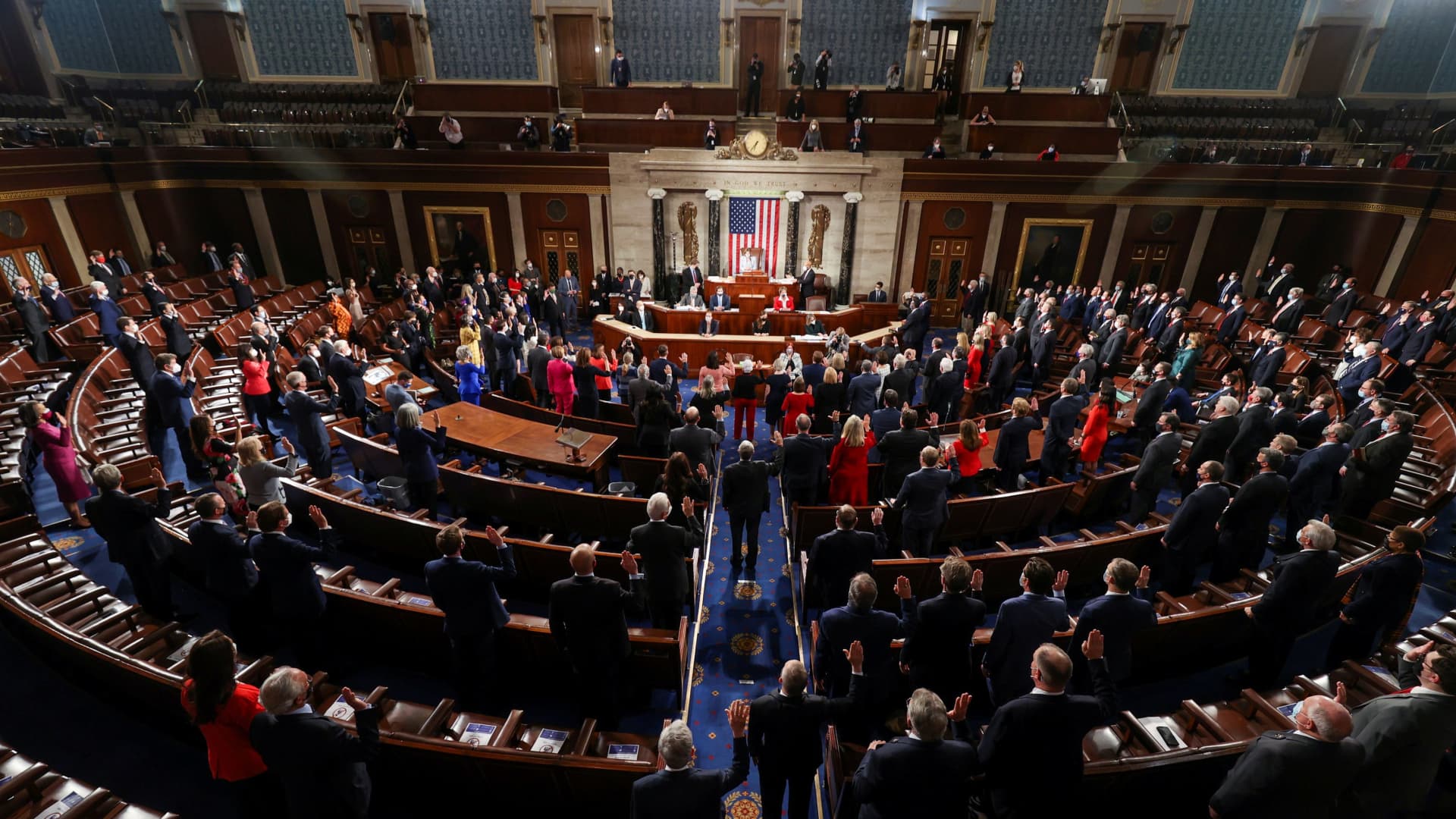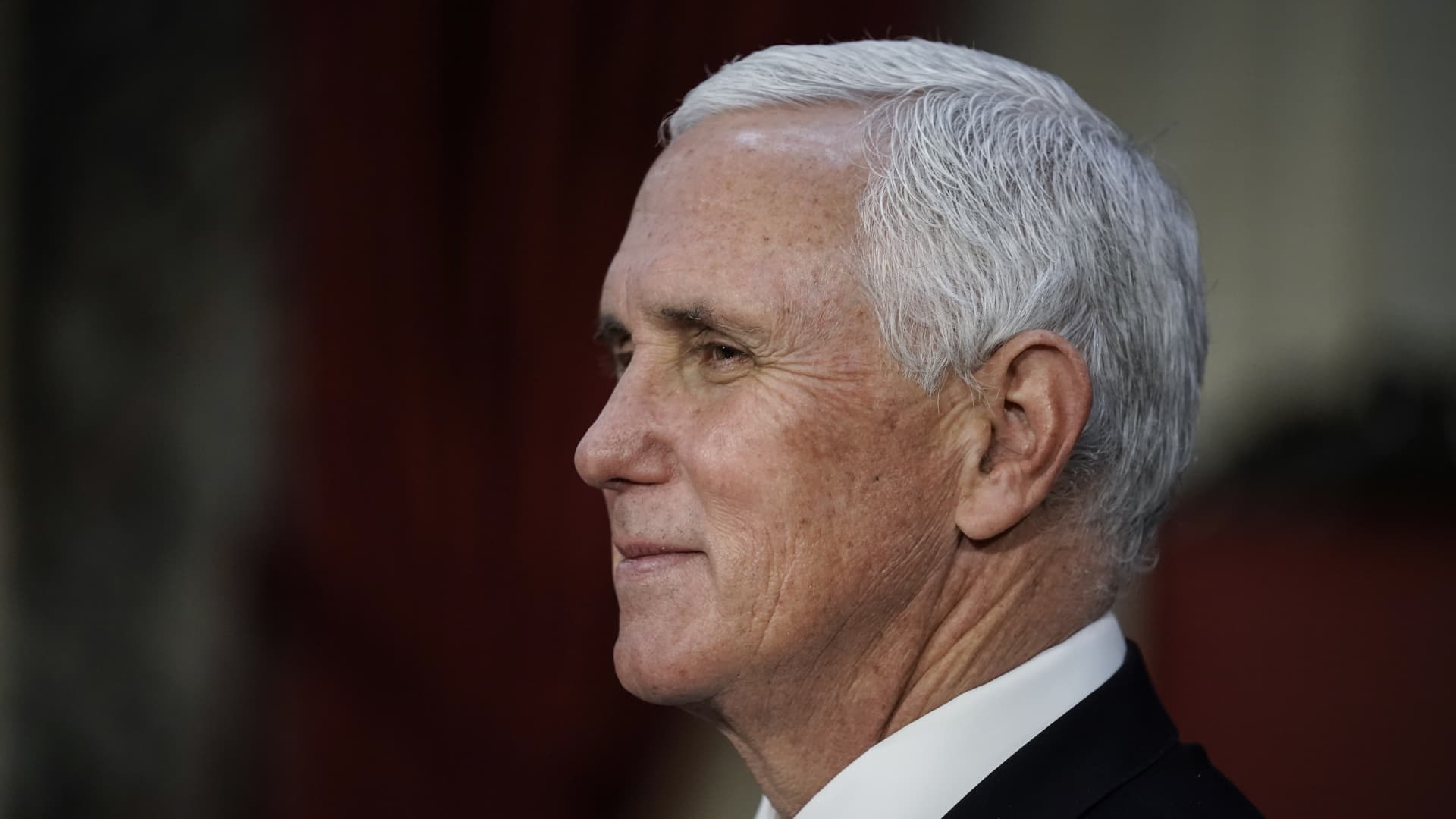
- Congress on Wednesday will count and confirm the votes cast by the Electoral College, a process that is virtually guaranteed to finalize President-elect Joe Biden's victory.
- But more than a dozen Republican senators and dozens more in the House are expected to lodge an unprecedented number of objections to key electoral votes.
- President Donald Trump's baseless assertion that the election was stolen from him could cause discomfort for Vice President Mike Pence, who is expected to preside over the joint session of Congress and ultimately declare Biden the winner.
Congress on Wednesday will count and confirm the votes cast by the Electoral College, a process that is virtually guaranteed to finalize President-elect Joe Biden's victory despite some Republicans' last-ditch plans to challenge the election results.
The joint session is set to kick off at 1 p.m. ET in the House chamber, and Vice President Mike Pence is expected to preside.
In past presidential cycles, the event was seen as more of a formality than as another battle in the war for the White House. It comes, after all, more than three weeks after states' electors cast their ballots, and nearly a month after the so-called safe harbor deadline to resolve disputes over the results.
Yet more than a dozen GOP senators and dozens more in the House have vowed to lodge an unprecedented number of objections to electoral votes in key states, despite pleas from Senate Majority Leader Mitch McConnell, R-Ky., and other Republicans to abandon the crusade. Doing so could lengthen the certification process by hours or even days, but experts say the eventual outcome will be unchanged.
"The eventual outcome I think is inevitable," said Keith Whittington, a politics professor at Princeton University, in an interview with CNBC. "It's just a question of how long it takes to get there and how many fireworks are occurring along the way."

The objectors, some of whom are widely rumored to have presidential ambitions, have reframed Wednesday's joint session as a final opportunity to raise doubts about the election proceedings and push for a 10-day audit of the results in a series of battleground states.
Money Report
Sen. Josh Hawley, R-Mo., was the first in the chamber to announce objection plans, and 11 more led by Sen. Ted Cruz, R-Texas, argued in a later statement that "unprecedented allegations of voter fraud" and "deep distrust" of the results demand investigation.
None of those senators' statements mentioned that President Donald Trump, who commands a wide and committed base of Republican support, has been relentlessly spreading unfounded and debunked fraud conspiracies since before the Nov. 3 election. The president and his allies have also filed dozens of lawsuits aimed at overturning the election results, including at the Supreme Court, but nearly all have been rejected.
Trump is refusing to concede to Biden and is falsely claiming he won the race, while heaping pressure on state officials to change the outcomes of their elections and attacking Republicans who have declined to follow along.
The president's baseless assertion that the election was stolen from him, and therefore that swaths of electoral votes for Biden should be rejected, holds peril for Republicans. McConnell reportedly warned his caucus that following Trump's wishes by objecting to the electoral count forces a vote that would likely divide the party.
It could also cause discomfort for the vice president, an unwavering loyalist to Trump who is expected to preside over the session and ultimately declare Biden the winner. Experts say Pence's role in the process is largely ceremonial, but Trump in recent days appeared to be hanging his hopes on the vice president to "come through" for him on Wednesday.
"Of course, if he doesn't come through, I won't like him quite as much," Trump said at a rally in Georgia on Monday night.
Political experts have also warned that Trump's efforts to undermine confidence in elections could dampen GOP turnout in Tuesday's all-important runoff races in Georgia, the outcomes of which will determine party control of the Senate. On Saturday, Trump in an hourlong phone call pressed Georgia Secretary of State Brad Raffensperger to "find" enough votes to overturn Biden's victory there.
After a recording of that call was leaked, Sen. Kelly Loeffler, R-Ga., on the eve of her race against Democratic candidate Rev. Raphael Warnock, said she too will file an objection. David Perdue, who is facing off against Jon Ossoff and whose term as Georgia senator expired Sunday, also urged Senate Republicans to object.
Once Congress finalizes the electoral count, Biden's final step is to take the oath of office on Jan. 20.
Here's how the meeting in Congress on Wednesday is expected to play out:
The election tally

The proceedings are set to begin at 1 p.m. ET in the House.
Pence will receive the states' slates of electoral votes in alphabetical order. The Republican and Democratic leaders of the House Administration Committee and the Senate Rules Committee will receive and count those votes.
Once a state's tally is announced, Pence will ask if there are any objections. If at least one member each of the Senate and the House file objections in writing, the two chambers will split off for up to two hours of debate. They will then vote separately on the objections.
Traditionally, it's all "fairly perfunctory," Whittington said. "It doesn't take very long to open all the envelopes and record what the votes were and then make an announcement."
Any objections are expected to be voted down — but the possibility of separate debates on multiple states' tallies could cause the process to drag on far longer than in past elections. In the past three cycles, certification took less than an hour in total, according to NBC News.
Once the votes are counted and the objections are settled, Pence will declare the results of the election.
Pence in the spotlight

Pence, who is suspected to be weighing a run for president in 2024, is likely eager to do all he can to avoid a barrage of criticism from Trump. The president has repeatedly lashed out at other Republicans he previously supported, especially Georgia Gov. Brian Kemp, after they refused to entertain his efforts to overturn the election.
But there's little Pence can do in his narrow role at Wednesday's joint session, experts say.
"He opens the ballots. That's his job," said Neil Kinkopf, a law professor at Georgia State University.
In carefully worded remarks to Georgia voters on Monday, Pence telegraphed support for the president while suggesting that he would allow the process to play out as expected.
"I know we all got our doubts about the last election. And I want to assure you, I share the concerns of millions of Americans about voting irregularities," he said. "And I promise you, come this Wednesday, we'll have our day in Congress. We'll hear the objections. We'll hear the evidence."
Still, Trump and his allies have falsely asserted that Pence's powers are far more expansive.
"The Vice President has the power to reject fraudulently chosen electors," Trump tweeted Tuesday.
In late December, Texas Republican Rep. Louie Gohmert, along with a group of Arizona Republicans, asked a federal court to declare that Pence had unilateral authority to decide which electoral votes would be counted.
The long-shot bid, in which Pence himself was listed as the defendant, received strong pushback from a Justice Department lawyer representing the vice president. The lawsuit was dismissed last week.






